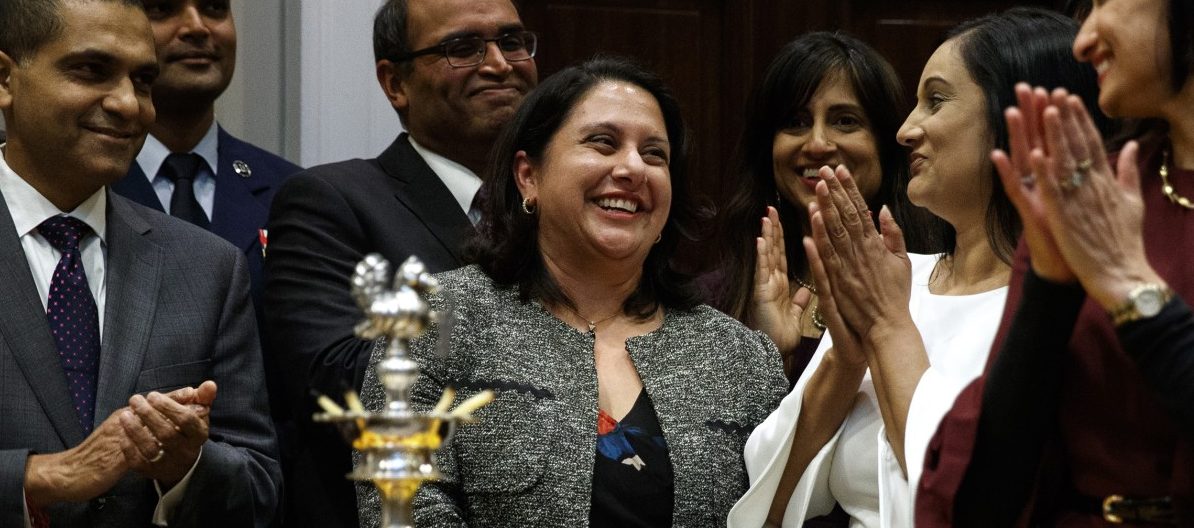The woman who has spent the past year overseeing President Trump’s regulatory rollback is now in line to become the newest member of the court that most often has the final say on the legality of administrative regulations. Neomi Rao, the regulations czar in the White House budget office, is Trump’s nominee for the D.C. Circuit seat vacated by Brett Kavanaugh.
Trump made the impromptu announcement on Tuesday (Nov. 13) at a Diwali ceremony at the White House. “She’s going to be fantastic—great person,” Trump said, adding that he was breaking the news a day earlier than the White House had planned.
Rao, 45, is a conservative legal scholar, a foe of the administrative state, and an advocate for an expansive interpretation of presidential power. Since July, she has been the administrator of the Office of Information and Regulatory Affairs, which analyzes the costs and benefits of proposed regulations from executive branch agencies. OIRA, which is part of the Office of Management and Budget, reviews regulations before they can take effect and has the power to alter them or or nix them altogether.
As head of OIRA, Rao has been in charge of Trump’s effort to aggressively cut regulations across the federal government. She boasted in a Washington Post op-ed last month that, under her tenure, the office has eliminated hundreds of regulations and is “pushing back the expansion of the administrative state.”
But recently, the D.C. Circuit has shown some skepticism of that deregulatory effort. It has, for instance, rejected several high-profile attempts by the Trump administration to eliminate or delay environmental rules adopted under President Obama, and several of the court’s liberal judges have expressed frustration about the administration’s foot-dragging on clean power regulations.
If confirmed by the Senate, Rao would join the court’s conservative wing. Among the court’s 10 full-time judges, three have been appointed by Republican presidents and seven have been appointed by Democrats. (The breakdown is eight Republicans and eight Democrats if senior judges are included.) She would be the fifth woman currently serving on the court.
Carrie Severino, the chief counsel and policy director at the Judicial Crisis Network, a group that advocates for conservative judicial nominees, told Circuit Breaker prior to Rao’s nomination that Rao would be an excellent choice to replace Kavanaugh, who served on the D.C. Circuit for 12 years before being elevated to the Supreme Court.
“She would be a great pick,” said Severino, who, like Rao, clerked for Justice Thomas on the Supreme Court and considers her a friend. “At these appellate level spots, you’ve seen the president take a very serious approach in making sure that these judges are in the mold of Justice Scalia.”
Rao also seems to fit the mold of the the man she is nominated to replace. Kavanaugh was a consistent skeptic of the regulatory state in his time on the D.C. Circuit.
Before her role as Trump’s regulatory czar at OIRA, Rao was a law professor at George Mason University, where she founded the Center for the Study of the Administrative State, which received money from conservative billionaire Charles Koch. As an academic, she has written that so-called independent agencies have acquired too much power and should be brought under direct control of the president.
The rest of her pedigree suits Trump, too. She attended Yale University and the University of Chicago Law School. She clerked for feeder Judge Harvey Wilkinson on the Fourth Circuit before clerking for Thomas. But one part of her story stands out among the dozens of other federal judges Trump has nominated: she is the daughter of two immigrants. Her parents, Zerin Rap and Jehangir Narioshang Rao, immigrated from India to the United States.
She is also one of the few judicial nominees who has worked in all three branches of government. In addition to her work as a clerk and for the Trump administration, Rao was a staffer on the Senate Judiciary Committee as counsel to Senator Orrin Hatch (R-UT). She also was associate counsel and special assistant to President George W. Bush.
And Rao is well-versed in other hot topics that often appear before the D.C. Circuit—international law and arbitration. She practiced both at the London-based law firm Clifford Chance LLP. (Disclosure: Circuit Breaker editor Katie Barlow is an attorney at Clifford Chance.)
Trump met with Rao in October at the request of former White House Counsel Don McGahn, who recommended Rao for the spot just before he left the White House. She will be Trump’s second nominee to the D.C. Circuit after he successfully nominated former Deputy White House Counsel Greg Katsas to the bench in 2017. Katsas was confirmed by a Senate vote of 50-48. Rao was confirmed as head of OIRA by a vote of 54-41.
Because of the D.C. Circuit’s importance, nominees to the court are often fiercely contested in the Senate, particularly if an opposite party from the president controls the chamber. But with Republicans maintaining Senate control, Rao is not expected to encounter too many obstacles to confirmation. Majority Leader Mitch McConnell (R-KY) has not yet announced when the Senate will hold a hearing for Rao, but if the GOP wants to act quickly, she can be confirmed during the lame duck session before the new Senate descends on Washington in January.
![]()

